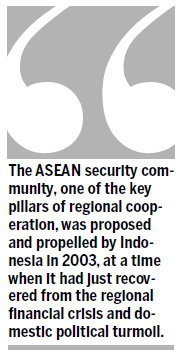Op-Ed Contributors
New era for regional relations
Updated: 2011-04-29 07:56
By Zheng Xianwu (China Daily)

Expanding exchanges and dialogue between China and Indonesia will benefit multilateral cooperation in Asia-Pacific
With its remarkable economic growth, China is both seeking and gaining more influence in multilateral cooperation arrangements in the Asia-Pacific region.
| ||||
Without doubt, of all the main platforms linking China and its neighbors, such as the East Asia Summit, ASEAN+3 Dialogue, and Asia-Pacific Economic Cooperation, ASEAN and its member states are an essential and indispensable part.
Generally speaking, these mechanisms, led by ASEAN, have kept pace with the integration process of Southeast Asia. And as the most powerful and most influential country in the region, Indonesia has played a key role in both processes.
History shows that whenever Indonesia enjoys internal political stability, the integration of Southeast Asia progresses rapidly. For example, the ASEAN security community, one of the key pillars of regional cooperation, was proposed and propelled by Indonesia in 2003, at a time when it had just recovered from the regional financial crisis and domestic political turmoil.
Soon after that, with the launch of the East Asian Summit, the gradually institutionalized ASEAN+3 Dialogue has become a main channel for cooperation in East Asia.
Sino-ASEAN economic and political relations have also experienced tremendous progress, with several important agreements being reached, such as those concerning the free trade area, and the Declaration on the Conduct of Parties in the South China Sea.
Most importantly, many countries followed China's example after it joined the Treaty of Amity and Friendship in Southeast Asia in 2003.
Thanks to the efforts of all sides, a web of cooperation, with its center in Southeast Asia, has been formed. Situated in the central region of this web, with its abundant resources and vast territory, and with its current political stability and economic liberalization, Indonesia has the potential to become an economic power.
Since signing the Joint Declaration on Strategic Partnership in 2005, relations between Indonesia and China have developed rapidly. Today the two countries have already made it a practice to hold dialogues and exchange opinions on questions of mutual concern.
The trade volume between the two increased 50.6 percent, reaching $42.75 billion last year. Sectors, such as culture and education, are also witnessing increasingly more cooperation.
It is in this healthy environment that Premier Wen Jiabao is visiting Indonesia. During the visit, he will hold talks with President Susilo Bambang Yudhoyono, and both will be present at the bilateral strategic business dialogue. They are expected to sign a number of cooperation agreements in education, travel, energy, banking and industry.
Without doubt, the progress of bilateral relations will propel multilateral cooperation in the whole Asia-Pacific region. As Premier Wen said in an interview before leaving for Indonesia on April 25, Indonesia can play an active and constructive role in Sino-ASEAN cooperation, and strengthen bilateral cooperation with China on important regional and international problems.
This year Indonesia is the presiding country of ASEAN, which means it will hold conferences such as ASEAN+3 and ASEAN+1.
After the last 10+6 summit in Hanoi, Vietnam, in December last year, it was decided to include Russia and the United States in the 2011 regional summit. And the conference of national defense ministers was also enlarged to include them.
That means, while "10+8" arrangements will replace "10+6" in summit meetings, military cooperation will also be introduced into the institution. How will China and Indonesia, both of which have long emphasized regional independence and non-military cooperation, deal with the new situation? And how will the two countries lead the ever-expanding multilateral cooperation so to make it more beneficial to East Asia?
These will be important questions for both countries.
The author is a researcher on international studies from Nanjing University.
(China Daily 04/29/2011 page8)
E-paper

Blowing in the wind
High-Flyers from around the world recently traveled to home of the kite for a very special event.
Preview of the coming issue
Image maker
Changing fortunes
Specials

British Royal Wedding
Britain's Prince William and his girlfriend Kate Middleton get married on April 29.

Costly dream
Uninhabited havens up for lease but potential customers face wave of challenges in developing them.

Models gear up car sales
Beauty helps steer buyers as market accelerates.



